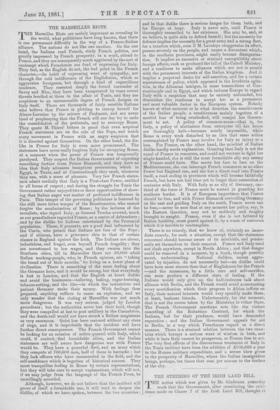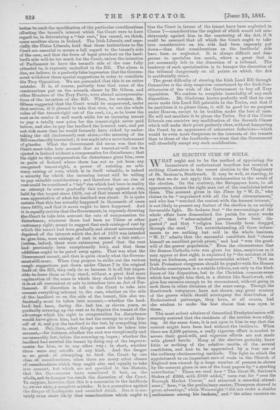THE STEERING OF THE IRISH LAND BILL.
THE notice which was given by Mr. Gladstone yesterday week that the Government, after considering the criti- cisms made on Clause 7 of the Irish Land Bill, thought it better to omit the specification of the particular considerations affecting the tenant's interest which the Court were to have regard to, in determining a "fair rent," has caused, we think, some needless alarm in Ireland. The Irish Liberals, and espe- cially the Ulster Liberals, hold that these instructions to the Court are essential to secure a full regard to the tenant's side of the.case, and that the force of legal precedent on the land- lord's side will he too much for the Court, unless the intention of Parliament to have the tenant's side of the case fully attended to, is expressly embodied in the Bill. The alarm is due, we believe, to a perfectly false impression that the Govern- ment withdrew these special suggestions in order to conciliate the Tory Opposition. We are persuaded that this is an entire mistake. It is, of course, perfectly true that some of the constructions put on the seventh clause by Mr. Gibson, and other Members of the Tory Party, were absurd misrepresenta- tions of the intention of the Bill. When, for instance, Mr. Gibson suggested that the Court would be empowered, under that section, if it pleased to take that view, to cut the whole value of the tenant-right out of the rent, i.e., so to lower the rent as to render it well worth while for an incoming tenant to pay a totally new price for the tenant-right never paid before, and also to pay the landlord the lowered rent, and yet not risk more than he would formerly have risked by under- taking the old (unlowered) rent alone,—the meaning of the Bill was absurdly travestied ; it was made into a mere instrument of plunder. What the Government did mean was that the Court must take into account that no tenant-at-will can be ejected in Ireland without a compensation for disturbance ; that his right to this compensation for disturbance gives him, even in parts of Ireland where there has not as yet been any recognised tenant-right, a power of resisting an arbi- trary raising of rent, which is in itself valuable' is indeed a. security for which the incoming tenant will be willing to pay valuable consideration ; and therefore that no rise of rent could be considered a "fairy rise which had been in reality an attempt to screw gradually this security against a rise, held by the tenant since 1870, out of that tenant without his even appreciation of what his landlord was about. It is quite certain that this has actually happened in thousands of cases since 1870, and that it never ought to have happened. And it is equally certain that the Government, in expressly directing the Court to take into account the rate of compensation for disturbance, wherever there had been no Ulster or other customary right, meant to suggest that such raisings of rent by which the tenant had been gradually and almost unconsciously deprived of the interest which the Act of 1870 was intended to give him, were raisings of rent in excess of a fair rent,— (unless, indeed, there were extraneous proof that the rent had previously, been exceptionally low), and that these additions ought to be pared away again, That was What the Government meant, and that is quite clearly what the Govern- mentstill mean. When they propose to strike out the various rough suggestions put down under Clause 7 in the original draft of the Bill, they only do so because it is all but impos- sible to.leave them as they stand, without a great deal more explanation of the sense in which they should be taken than iteiseat all convenient or safe to introduce into an Act of Par- liament. If discretion is left to the Court to take into account everything relevant to the ease, whether on the side of the landlord or on the side of the tenant, this also un- doubtedly must be taken into account,—whether the land- lord had been, during the last ten or eleven years, so• gradually screwing up the rent as to deprive the tenant of the advantage which his right to compensation for disturbance- would have given him, had he had the courage to avail him- self of it, and put the landlord to the test, by compelling him to evict. But, then, other things mud also be taken into account,--for instance, whether the rent was exceptionally and unreasonably low, before the screwing-up began ; whether the landlord had assisted the tenant by doing any of the improve- ments for him, or in any other way ; in short, whether there were any set-offs of any kind. And the danger is. so great of attempting to bind the Court by one class of considerations, when there are many other classes of! considerations which they ought also and equally to take into account, but which are not specified in the Statute, that the Government have considered it best, on the whole, not tolamper too much the discretion of the Court. To suppose, however, that this is a concession to the landlords is, weave sure, a complete mistake. It is a precaution against the danger of inadequate and onesided detail. But it is cer- tainly even More likely that considerations which ought to
bias the Court in favour of the tenant have been neglected in Clause 7—considerations the neglect of which would tell mis- chievously against him in the construing of the Act, if it could be assumed that all which the Court ought to take into consideration on his side had been expressly put down—than that considerations on the landlords' side have been so neglected. It is always difficult and dan- gerous to specialise too much, where a great deal is yet necessarily left to the discretion of a tribunal. The tendency of such specialisation is to hamper the discretion of the tribunal dangerously on all points on which the Act is accidentally silent.
The great difficulty of steering the Irish Land Bill through Committee is the deep suspicion entertained by the Irish Con- stituencies of the wish of the Government to buy off Tory opposition. We confess to complete incredulity of any such disposition. Mr. Gladstone knows perfectly well that he can never make this Lanel Bill palatable to the Tories, and that if he mutilates it to please them, it will be good for no purpose under Heaven, except to be trodden under the foot of men. He will not mutilate it to please the Tories. But if the Ulster Liberals can contrive any modification of the Seventh Clause which will make their point perfectly clear, without hampering the Court by an appearance of exhaustive definition—which would be even more dangerous to the interests of the tenants than to those of the landlords—we trust that the Government will cheerfully accept any such modification.




















 Previous page
Previous page